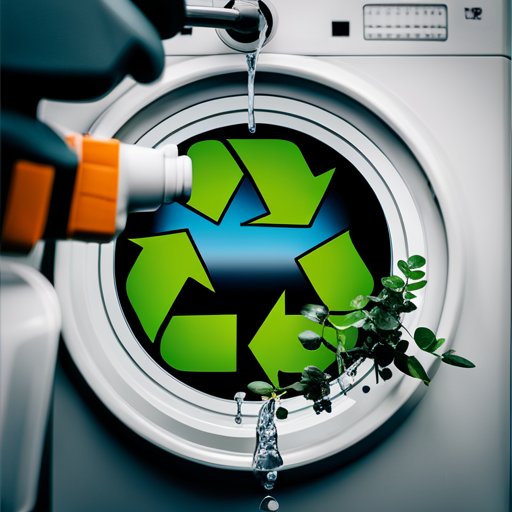Are you looking for ways to reduce your carbon footprint and live a more eco-friendly lifestyle? One simple way to do so is by reusing the waste water generated by your reverse osmosis (RO) filtration system.
For every 3-4 gallons of purified water produced by an RO system, up to 20 gallons of waste water are generated. Instead of just letting this water go to waste, you can use it for household chores like laundry, which not only saves water but also saves money on your water bills.
Using RO waste water for laundry is a simple and effective way to promote sustainability in your daily life. By doing so, you can reduce your water consumption and minimize the amount of water that goes to waste. Plus, it’s a great way to save money on your water bills, as you’ll be using less water overall.
In the following sections, we’ll explore the various uses of RO waste water, the benefits of using low-pH detergents, and some potential risks and considerations to keep in mind. So, let’s get started and learn how to incorporate this eco-friendly laundry hack into your daily routine!
Key Takeaways
– Reusing RO waste water for laundry and greywater irrigation is an eco-friendly and cost-effective option.
– Low-pH detergents should be used to prevent mineral buildup and ensure cleaner clothes.
– Eco-friendly detergents are a better choice for the environment.
– Testing TDS levels before using RO waste water for laundry is important to prevent mineral buildup and ensure safety.
RO Waste Water Uses
You can reuse the waste water from your reverse osmosis system for household chores like washing clothes, which is eco-friendly and saves you money.
Greywater irrigation is another option for using RO waste water, where the water is used for watering plants and lawns, but it requires a separate plumbing system.
Using RO waste water for washing clothes is a simple and convenient way to conserve household water. Not only does reusing RO waste water save water, but it also saves money on water bills.
The average household can save up to 7,000 gallons of water per year by using greywater for irrigation and reusing RO waste water for washing clothes.
This eco-friendly laundry hack is a small step towards household water conservation.
Using Low-pH Detergents
To prevent mineral buildup in your washing machine, consider using detergents with a low pH level when washing clothes with reverse osmosis reject water. Eco-friendly detergents are a great option as they contain fewer harsh chemicals, making them better for the environment.
Additionally, these detergents use pH balancing techniques to help trap extra minerals in the RO waste water before they attach to clothes. Using low-pH detergents not only helps prevent mineral buildup in your washing machine, but it also ensures that your clothes come out cleaner and fresher.
The low pH level helps break down dirt, grime, and oils, leaving clothes looking and smelling great. So, the next time you wash your clothes, try using an eco-friendly detergent with a low pH level for a more sustainable and effective laundry experience.
Potential Risks and Considerations
Consider the potential risks and drawbacks before using reverse osmosis reject water for washing clothes, as high levels of minerals and salts can cause damage to washing machine machinery and potentially result in dirtier clothes if too much water is added. Here are some things to keep in mind:
1. Mineral buildup: RO waste water can potentially cause mineral buildup in washing machine machinery if TDS levels are above 1200 ppm. This can lead to issues such as clogged pipes, decreased water flow, and damage to the machine. It’s important to regularly clean and maintain your washing machine to prevent this from happening.
2. Washing machine maintenance: Using RO waste water for washing clothes can put extra strain on your washing machine, as it contains higher levels of minerals and salts than regular tap water. Consider getting your washing machine serviced more frequently if you plan on using RO waste water regularly.
3. Amount of water added: Adding more water than necessary to a washing machine can result in dirtier clothes. Be mindful of how much water you’re adding and adjust the amount accordingly.
4. Quality of RO waste water: The quality of RO waste water can vary depending on the type of filtration system and the source of the water. Make sure to test the TDS levels before using RO waste water for washing clothes to ensure that it’s safe for your machine and won’t cause damage or mineral buildup.
Conclusion
Congratulations on learning how to use RO waste water for laundry! By implementing this eco-friendly hack, you can save money and help reduce water waste.
Remember, the waste water produced by RO filtration systems can be reused for a variety of household chores, including laundry. To ensure the effectiveness of this method, it’s important to use low-pH detergents that are gentle on clothes and won’t damage the RO membrane.
Additionally, it’s crucial to consider any potential risks and take appropriate measures to ensure the safety of your family and home. With these precautions in mind, you can confidently embrace this eco-friendly solution and make a positive impact on the environment.
